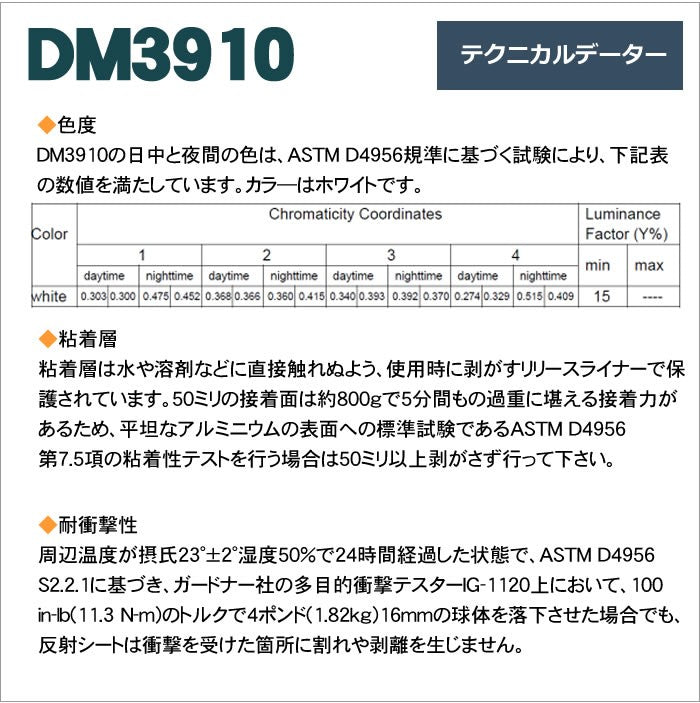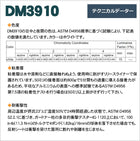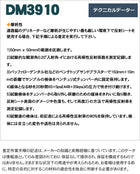Description
For soft materials, polyvinyl chloride, micro prism reflective material
Soft material prism reflectors are available in two types: ultra-high brightness DM3910 and normal brightness DM3610.
DM3910 Prism Type Reflective Sheet - Super Bright
- DM3910 Ultra-high brightness roll for soft materials
- DM3910 Ultra-high brightness for soft materials m/cut
- DM3910 For soft materials Ultra-high brightness A4 size
DM3610 Prism-type reflective sheet - normal brightness
- DM3610 For soft materials, normal brightness, roll
- DM3610 For soft materials, normal brightness, m/cut
-
DM3610 For soft materials, normal high brightness, A4 size
Reflective material sold in cut lengths. Purchase at your desired length!
DM3910 Prism Delineation Reflective Sheeting is designed for flexible delineators, post cones, guardrail delineators, and barrier covering delineators.
Ministry of Land, Infrastructure, Transport and Tourism NETIS registered product Registration number KT-180125-A
We will cut it to your desired size (in meters).
Product Structure
The DM3910 features a smooth, high-brightness, abrasion-resistant, weather-resistant, and UV-resistant microprismatic retroreflective layer.Ultra-high brightness prism type reflective sheet dm3910cut










■Super bright prism type reflective sheet dm3910 45.7m x 1.22m roll
Type: Ultra-high brightness prism type reflective sheet Product size: 45.7m x 1.22m roll Standards and certification: ASTM D4956 TYPEV
Material: PVC Backing Adhesive Layer: Yes Applications: Delineators, traffic cones, etc. Characteristics: Ideal for construction of soft materials Printing Performance: None Country of Origin: China
What is the New Technology Information System (NETIS)?
NETIS registration: Ministry of Land, Infrastructure, Transport and Tourism NETIS registered product Registration number KT-180125-A
The Ministry of Land, Infrastructure, Transport and Tourism has established the New Technology Information System (NETIS) for the purpose of sharing and providing information related to new technologies in order to utilize new technologies. NETIS is a database system operated on the Ministry of Land, Infrastructure, Transport and Tourism's intranet and the Internet. [Weather resistance years of reflective material products]
Descriptions of the evaluation procedures and years of use are based on the manufacturer's knowledge and practical experience. This data is intended as a source of information only and is provided without warranty and does not constitute a guarantee. Due to the wide variety of possible applications, the customer must make their own determination of the suitability of this material for their particular purposes prior to use.Adhesive layer
The adhesive layer is protected by a release liner that is peeled off before use to prevent direct contact with water, solvents, etc. The 50 mm adhesive surface has adhesive strength that can withstand an excessive load of approximately 800 g for 5 minutes, so when performing the adhesion test of ASTM D4956 Section 7.5, which is the standard test for flat aluminum surfaces, do not peel off more than 50 mm.
Shock-resistance
The reflective sheeting will not crack or peel at the impact point when subjected to a 4 pound (1.82 kg) 16 mm sphere dropped with a torque of 100 in-lb (11.3 Nm) on a Gardner Multipurpose Impact Tester IG-1120 in accordance with ASTM D4956 S2.2.1, at an ambient temperature of 23°C ± 2°C and 50% humidity for 24 hours.
Flexibility
DM3910 meets the flexibility requirements of ASTM D4956, Section 6.7 and S2.2.2. The product is very flexible and will not break even if bent for approximately 1 to 2 seconds using a 3.2 mm diameter rod.
Weather resistance
DM3910 meets the weathering standards of ASTM D4956, Section 6.4. The material is highly weather resistant and does not show any obvious cracks, peeling, pitting, seizing, edge lift or curvature, or expansion or contraction of more than 0.8 mm. The retroreflection coefficient measurement during outdoor exposure was performed at an observation angle of 0.20° and incidence angles of -4° and +30°, and the minimum retroreflection coefficient (RA) after weathering test was 80% of the value in the table above. When tested using a xenon arc weathering tester based on ASTM D4956, S3, DM3910 far exceeded the weathering requirements.
Solvent resistance
DM3910 will not dissolve, blister or wrinkle if wiped with a soft cloth moistened with kerosene, petrol, turpentine, varnish naphtha, ethanol or 5% HCL sodium hydroxide.
Specular gloss
DM3910 has a specular gloss of not less than 40 when tested at an 85° angle according to ASTM D523.
Contractility
After storing the sheet at 23°C ± 2°C and 50% relative humidity for at least 1 hour, remove the release liner from a reflective sheet specimen measuring approximately 230mm x 230mm and place it on a flat surface with the adhesive side up. After removing the release liner, measure the change in the area of the specimen 10 minutes and 24 hours later. The specimen area will not shrink by more than 0.8mm in 10 minutes, or 3.2mm in 24 hours.
Apply
The reflective sheeting can be applied to any smooth, clean, dry surface between 10° and 38° Celsius.
Reflective material specification comparison table
Comparison of specs by reflective material product - Weather resistance and brightness
Comparison of specs by reflective material product - Surface
Comparison of specs by reflective material product - compatibility, processing method, features, and applications
Specification comparison by reflective material product - conformity with international standards


























